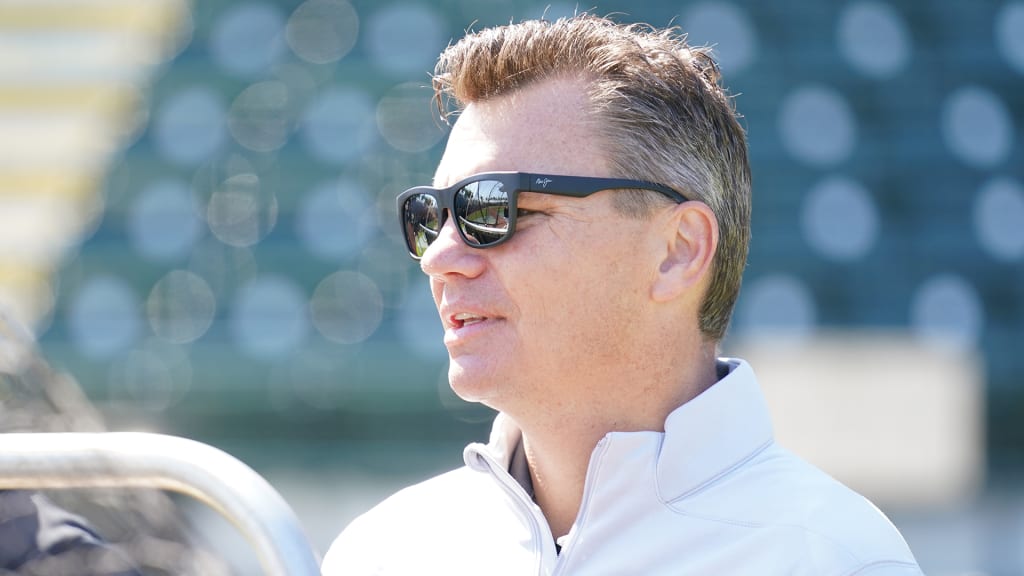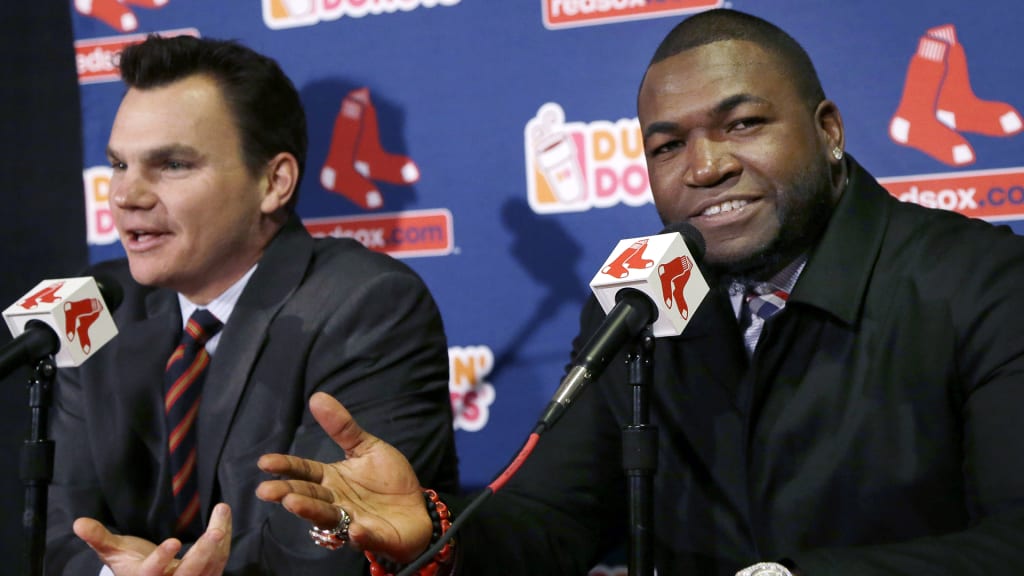
During Spring Training, Pirates general manager Ben Cherington sat down with MLB.com to discuss his first offseason on the job and what he’s learned since serving as general manager of the Red Sox from 2011-15. This is the first part of a series looking at how he’s applying those lessons
PITTSBURGH -- Near the end of his run as general manager of the Red Sox, Ben Cherington led an exercise in self-evaluation. He and members of Boston’s baseball operations department reviewed every decision they had made over a two-year period. They left no stone unturned, no question unasked.
They assessed their own decisions, good and bad, on a case-by-case basis. What was their goal at the time? What information did they consider? What did they miss? Were their priorities right? It was a useful process, informative in its own way, but it was like counting rings on every tree when Cherington wanted to see the forest. Or, perhaps, to find a way out of it.
“I think it's harder in some ways to get at the root of issues because you're kind of thinking about it strictly in almost a transactional way,” Cherington said. “But as I left the Red Sox, I think I was focused less on the transactional and more my own personal impact and style of leading, on the environment or people, less in the weeds and more from 10,000 feet. … And I found that to be probably as or more helpful, really, in the long run.”
Cherington spent 17 seasons with the Red Sox, starting as an area scout and working his way up to GM in October 2011. He turned heads by offloading significant salaries in a 2012 blockbuster deal with the Dodgers, hired manager John Farrell, astutely upgraded the roster with high-character veterans in free agency and guided the Red Sox to a World Series victory in 2013.
Cherington received the Sporting News Executive of the Year Award that winter, finishing just ahead of Pirates GM Neal Huntington, a friend and fellow Amherst alumnus. In his three other seasons at the helm, Boston finished last in the American League East.
The Red Sox brought in Dave Dombrowski to lead their baseball operations department in August 2015, and Cherington subsequently resigned. He was praised years later, however, for having left behind the young core of Boston’s World Series championship team in 2018 – players like Mookie Betts, Andrew Benintendi, Jackie Bradley Jr., Xander Bogaerts and Eduardo Rodriguez.
“It was an incredible experience, incredible place and incredible learning from it,” Cherington said. “After the fact, I did want to learn from it because I wanted to get better, no matter what I was going to do next. So I probably focused a little bit more on the things that didn't go well.”
One thing that stood out? Reflecting on his first few months as GM, Cherington said he probably felt pressure to act too quickly. At the time, it made sense. The Red Sox were eager to bounce back from a drama-filled collapse in 2011, so the situation demanded action. He had been around for two championship runs in 2004 and ’07. Given how much time Cherington spent working alongside Theo Epstein, how could he not be ready? Even as a first-time GM, what could he possibly have to learn?
Plenty, as it turned out. The 2012 Red Sox went 69-93, the same record the Pirates had in 2019, in a season defined by injuries, inconsistent play and clubhouse drama under manager Bobby Valentine.
“Even though I had been there for a long time, I should have focused more on learning in those first few months,” Cherington said. “So that probably influenced how I thought about this job in the sense of, rather than trying to impact outcomes and act, think more about how I can help other people do their jobs and learn.”
Similarly, some anticipated that Cherington’s first few months in Pittsburgh would be full of action. The Pirates made only one major move this offseason, trading center fielder Starling Marte to Arizona for prospects. While external speculation swirled about trades and turnover, Cherington set up a series of one-on-one conversations and group meetings with Pirates staff during his first weeks at PNC Park.
“Probably something I learned from Boston is that, as much as I've always wanted feedback -- and I do -- in this job, you kind of have to pursue it more intentionally,” he said. “I think that's something we're really working on and need to keep working on -- because it’s still really early here -- is creating an environment where people feel like feedback is not just some sort of word that we think sounds good and we ought to have. Like, no. I really need it, and I'm counting on you to give it to me.”

In the Red Sox book “Homegrown,” author Alex Speier noted that Cherington often recommends “The Wisdom of Crowds,” a book with the central thesis that aggregating information and opinions from groups leads to better decisions than those made by individuals. Cherington set out to do that by building relationships and learning as much as he could about the organization, all while completing the managerial search that led him to current skipper Derek Shelton, hiring Major League coaches and overseeing Minor League staffing decisions.
Pirates assistant general manager Kevan Graves described Cherington’s approach as more empowerment than delegation, a balance of patience and urgency. He’s shown a genuine sense of curiosity, Graves said, challenging colleagues with unbiased questions and conversations before finally saying, “I trust you. Go run with it.” And he means it.
“My sense is that he’s reflected, he’s learned, he’s cemented some convictions and some thoughts. It seems to just really benefit the entire process,” said Graves, who served as the Pirates’ interim GM until Cherington was hired. “Through all that, he’s also learning our players, the incumbent personnel, evaluating the people and the processes in place while recognizing that’s going to be longer than a one-week/one-month process.”
Those first few weeks weren’t all interviews and information-gathering, though, even if Cherington found time for little else beyond working, eating and sleeping.
During one of his first days on the job, Cherington told Graves it’d be nice to get everyone together -- informally, outside of the office, not just to talk about baseball. So, the Pirates staff strolled down North Shore Drive and filled up the entire outdoor area at the Burgatory restaurant for appetizers and drinks.
“It was awesome,” Graves said. “There’s always time to connect with somebody. There’s always time to have a conversation or work through something. He finds ways to genuinely connect with people. That’s been my experience and what I’ve gathered from everyone in the organization.”


